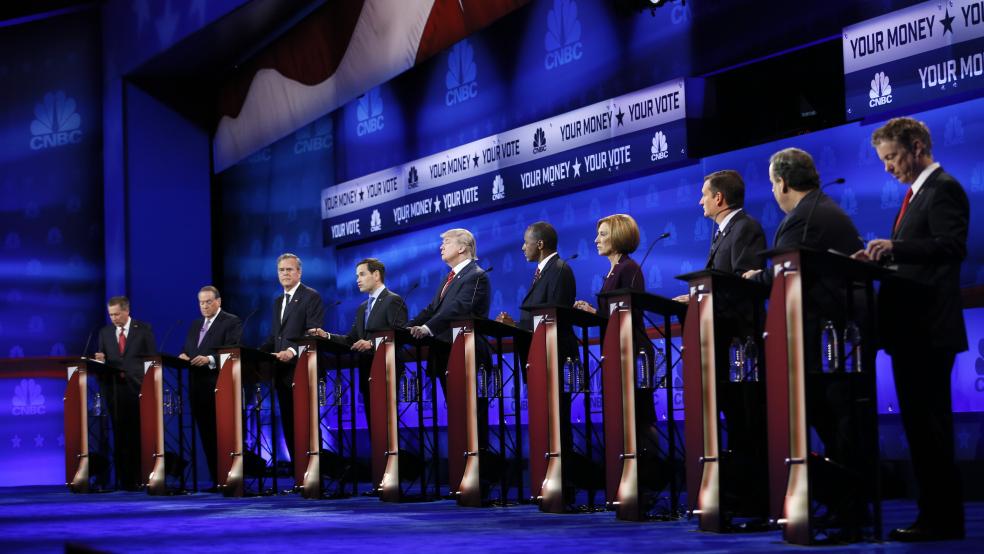As Donald Trump continues to dominate the Republican presidential race, the pressure will mount for lesser candidates to pull out of the race, winnowing a crowded field and potentially allowing for support to coalesce around a smaller group of challengers.
That pressure is likely to build early next year, but two more GOP presidential candidates are already signaling that their campaigns may be reaching the end of the line.
Former Arkansas Gov. Mike Huckabee said in an interview Wednesday that he will almost certainly drop out of the crowded field unless he finishes in the top three in Iowa’s first-in-the-nation caucuses in early February. Huckabee won the caucuses in 2008, but he has lagged far behind in statewide and national polls this election cycle.
Related: Carson May Be Down, but He Doesn’t Think He’s Out
“If we can’t come within striking distance of the victory or win it, then I think we recognize that it’s going to be hard to take that onto the other states,” Huckabee said in a radio interview with Simon Conway on Wednesday, according to The Hill.
Sen. Ted Cruz, with a sophisticated ground game and a key endorsement from Rep. Steve King (R-IA), an ardent foe of illegal immigrants on a par with Trump, has emerged recently as the man to beat in Iowa. A recent Des Moines Register/Bloomberg poll put the Texas senator in first place among likely Iowa GOP caucus goers with 31 percent, followed by Trump with 21 percent, Carson with 13 percent and Rubio 10 percent.
Huckabee was tied for sixth place in the survey, with 3 percent support.
The other likely dropout is Sen. Rand Paul of Kentucky, who for the second time in recent weeks has threatened to sit out a nationally televised GOP presidential debate if he was relegated to the “undercard” preceding the main event. “I won’t participate in any kind of second-tier debates,” Paul said on Fox News Radio's “Kilmeade & Friends” on Wednesday, according to BuzzFeed News.
It may be just stubborn pride on Paul’s part. But for a freshman senator trailing so far behind in the polls, taking himself out of a long night of nationally televised political debating just weeks before the formal start of the primary season suggests a frustrated politician ready to throw in the towel.
Paul came close to being excluded from CNN’s Dec. 15 main event because of his lowly showing in the polls. The network decided at the last minute to include him after Paul raised a fuss.
Related: How Big Is Trump’s Lead? It Depends on the Poll
The new rules to qualify for the next Republican primary debate, to be hosted by Fox Business Network on Jan. 14, likely will exclude several of the nine candidates who made it to the main stage for the CNN debate — and Paul is almost certain to be one of them.
“I frankly just won’t be told by the media which tier I’m in, and we’re not willing to accept that, because we’re a first-tier campaign, and we’re in it to win it, and we won’t be told that we’re in a tier that can’t win,” he said.
But after months of raucous campaigning and a half dozen debates, the GOP top tier is taking shape — and neither Huckabee nor Paul is part of the elite group. The latest Real Clear Politics national polling averages puts Trump on top with 35.1 percent of the likely GOP vote, followed by Cruz with 18.1 percent, Sen. Marco Rubio of Florida with 11.5 percent, retired neurosurgeon Ben Carson with 10 percent, former Florida Gov. Jeb Bush with 4.4 percent and New Jersey Gov. Chris Christie with 3.9 percent.
Related: When Ted Cruz’s Kids Became a Target, An Unwritten Rule Was Violated
Sen. Lindsey Graham of South Carolina pulled the plug on his campaign on Monday. Meanwhile, Carson’s threat this week to shake up his campaign staff after he has steadily lost altitude has spurred speculation that he may also be headed for the door sooner than he’d like.





